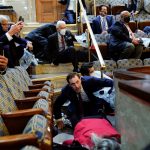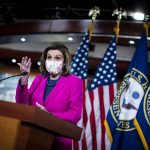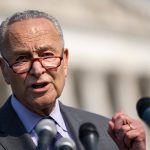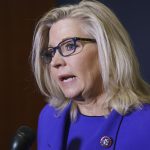Joe Manchin, one of Democrats’ two centrist holdouts on a $1 trillion-plus social spending bill, says a deal is close — while acknowledging he still has problems with several provisions even after a weekend meeting with President Joe Biden.
The West Virginia senator told reporters Monday that reaching a framework to execute the bulk of Biden’s domestic agenda “should be” feasible this week. However, Manchin said he still has concerns with the party’s efforts to expand Medicare benefits to vision, dental and hearing, as well as a push to close the Medicaid coverage gap and expand paid leave.
“I’m concerned about an awful lot of things,” Manchin said.
The White House and Democratic leaders are pushing for an agreement on an outline for the bill this week, before the president leaves for an overseas trip that includes a global summit on climate change. Though most in the party are projecting optimism they’re closing in on a deal that will unite progressive and moderate factions, Manchin and the White House are still haggling over a top line number, as well as exactly which programs to include and for how long.
Senate Majority Leader Chuck Schumer, who also met Sunday with Manchin and Biden, said Monday that negotiators are making progress and have only “three to four outstanding issues.”
Asked if he could agree to a $1.75 trillion social spending bill, Manchin reiterated Monday that he still wants the price tag to remain at $1.5 trillion. Meanwhile, Democratic leaders are still pushing for roughly $2 trillion after coming down from $3.5 trillion, a climbdown that’s bound to require big slashes to specific policy proposals.
The flurry of negotiations comes as House leaders eye a Wednesday vote on the bipartisan infrastructure bill, which they’re aiming to pass before the Oct. 31 expiration of federal surface transportation funding. But in order to get that vote slotted, they need a framework with support from Manchin and the second centrist holdout, Sen. Kyrsten Sinema (D-Ariz.), in the next 48 hours.
A spokesperson for Sinema said the senator “continued discussions throughout the weekend, and progress continues to be made.” Sinema has been working with Sen. Elizabeth Warren (D-Mass.) on proposals that would bring in revenues from the wealthy and corporations without raising rates on corporations or high-income earners.
Senate Democrats are expected to introduce a so-called billionaires tax this week, a proposal that Manchin said he is on board with.
“I support basically everyone paying their fair share of taxes,” Manchin said Monday. “We all have a different approach to that. But as far as on the taxation, I think that corporations should be paying at least a minimum if you’re doing business in the United States.”
Without an agreed-upon outline for the social spending plan, House progressives are set to line up against the bipartisan infrastructure bill, which wouldn’t bode well for the party ahead of the Virginia gubernatorial election next week.
When asked if a deal could be reached by Wednesday, Biden told reporters that it could happen “with the grace of God and the good will of neighbor." He added, referring to Biden’s overseas travel set to start this week, that "it’d be very positive to get it done before the trip."
Over the weekend, paid family leave and Medicare benefits for vision, dental and hearing were potentially on the chopping block amid opposition from Manchin and resistance from Sinema in some respects. Manchin did not detail specific concerns with the party’s proposed paid leave program, but he said Monday that he’s still working on reaching an understanding with his colleagues on the bill’s Medicaid provisions.
Manchin told reporters on Monday that he’s worried about creating inequity between states that have already expanded Medicaid — which include his home state of West Virginia — and those that have not. Expansion states pay 10 percent of the cost of the expansion, and 12 states have not yet expanded Medicaid coverage.
"The problem that I have with that one right now, we’re paying 90/10. So 10 percent is being paid by all the states. For states that held out and be rewarded 100 percent is not fair," Manchin said.
The Medicaid assistance in the bill is a top priority for House Majority Whip Jim Clyburn (D-S.C.) and Sen. Raphael Warnock (D-Ga.), who hail from states where hundreds of thousands of poor people would be able to enroll in the program. That amounts to a tangible win they and other red-state Democrats could campaign on next year.
But even lawmakers from states that would benefit from the Medicaid expansion have complained about the details of the policy, worried that extending it for just a few years will give a future GOP Congress ample opportunity to let it expire. Rep. Lloyd Doggett (D-Texas) cited concern about “anything that leaves these uninsured poor people who have few advocates to fall off a cliff and have to go through this all over again.”
In addition to explaining his position on Medicaid, Manchin detailed his qualms with the Medicare expansion that Sen. Bernie Sanders (I-Vt.) has championed.
Manchin said that his "big concern right now" is the current projection that Medicare would hit a point of fiscal insolvency in 2026, complicating the path to an expansion.
“Medicare and Social Security is a lifeline to people back in West Virginia, most people around the country," he told reporters. "You’ve got to stabilize that first before you look at basically expansion so if you’re not being fiscally responsible that’s really concerning.”
Another enormous issue for many Democrats, both progressives and centrists, is allowing the federal government to negotiate drug prices in some fashion. One idea being discussed is allowing Medicare to negotiate prices on a limited number of drugs, similar to the Veterans Affairs’ system, according people familiar with the discussions.
The issue hasn’t been settled yet, and some Democrats are worried it could get further watered down.
Alice Ollstein and Sarah Ferris contributed to this report.





















